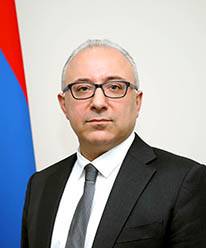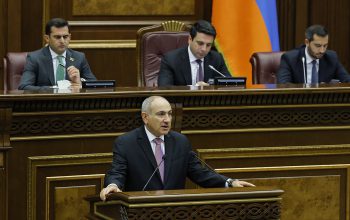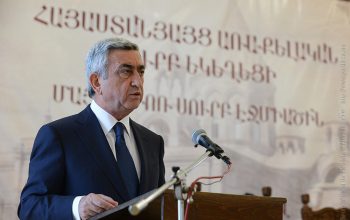Deputy Foreign Minister Mnatsakan Safaryan has assured that outsourcing the control of the road connecting Armenia with Nakhichevan to a private company does not violate Armenia’s sovereignty.
Recently, Prime Minister Pashinyan announced that Armenia is prepared to facilitate Azerbaijan’s connection to Nakhichevan without compromising Armenia’s territorial integrity or border inviolability. For the first time, Pashinyan mentioned the possibility of outsourcing security functions to a private security organization. While the Prime Minister did not provide specifics, he noted that this approach has been positively received in both Baku and Moscow.
“Additional security functions can also be carried out by licensed organizations in Armenia, such as custody organizations,” Safaryan added.
Today, Deputy Foreign Minister Mnatsakan Safaryan clarified that it is not yet clear which custody organization might be involved, but he emphasized that Armenian customs and border guards would also maintain control of the road alongside the private company.
Safaryan addressed various questions about the outsourcing of road control to a private company. He affirmed that while the specifics of the private entity are not yet clear, Armenian customs and border guards will remain involved in overseeing the road. Safaryan assured that Armenia’s sovereignty is not compromised by this arrangement and emphasized that the principles of Armenian control will continue to apply. Despite opposition concerns that this move might undermine Armenia’s sovereignty, the government maintains that the arrangement has been positively received by Baku and Moscow.
Opposition figures argue that outsourcing security functions to a private company at Armenia’s border is another concession to Baku.
“Armenia has once again capitulated to Azerbaijan’s demands. Azerbaijan says Armenians should not exercise control, and Pashinyan has agreed,” said Artur Khachatryan, a deputy from the Hayastan faction.
According to Khachatryan, entrusting road safety to a private company violates Armenia’s sovereignty. He believes border control should be managed by Armenia’s border guards and customs services.
“I don’t know if there are private border guards, but I wouldn’t rule out the creation of an organization like Frontex for advice and support. However, I am fundamentally opposed to this idea. Border security and customs inspections should be conducted by Armenian officials,” Khachatryan asserted.
Although Armenia and Azerbaijan agreed last month to remove the article on unblocking regional communications from the draft peace agreement, discussions about connecting Azerbaijan to Nakhichevan via Syunik have recently resumed, with involvement from other regional countries.
Yesterday, the Assistant Foreign Minister of Iran and the General Director of Eurasian Affairs discussed the issue with the Russian Ambassador to Iran. Mojtaba Demichilu told Alexey Dedov that Iran opposes changes to internationally recognized borders in the Caucasus and that the interests and concerns of all regional countries should be considered.
These high-level warnings from Iran followed statements from Russian Foreign Minister Sergey Lavrov, who, about two weeks ago, accused Yerevan of “sabotaging” the agreement on communications through Syunik.




